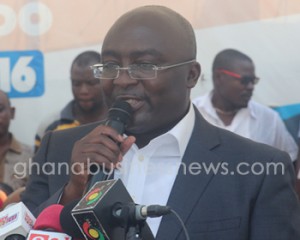Profile of the Vice President-Elect
 Alhaji Dr Mahamudu Bawumia is an economist and a banker.
Alhaji Dr Mahamudu Bawumia is an economist and a banker.
He was born on October 7, 1963 in Tamale to the late Alhaji Mumuni Bawumia, former Chairman of the Council of State (1992–2000) and Hajia Mariama Bawumia.
His father was a teacher, lawyer and politician and a Mamprugu Royal and Paramount Chief of Kperiga in the Northern Region.
Dr Bawumia is married to Samira Ramadan Bawumia, the only daughter of Alhaji Ahmed Ramadan, the former PNC National Chairman with three children.
Educational Background
He was born into a large family and the 12th of his father’s 18 children and the second of his mother’s five children.
He attended the Sakasaka Primary School in Tamale, and gained admission to the Tamale Secondary School in 1975.
He was President of the Ghana United Nations Students’ Association (GUNSA) in 1981.
After his second cycle education, he went to the United Kingdom where he studied banking and obtained the Chartered Institute of Bankers Diploma (ACIB).
He obtained a First Class Honours Degree in Economics from Buckingham University in 1987.
He then obtained a master’s degree in Economics at Lincoln College, Oxford, and obtained a Ph.D. in Economics at the Simon Fraser University, Vancouver, British Columbia, Canada in 1995.
His areas of specialisation include Macroeconomics, International Economics, Development Economics and Monetary Policy.
Work Experience
From 1988 to 1990, Dr. Bawumia worked as a lecturer in Monetary Economics, and International Finance at the Emile Woolf College of Accountancy in London, England.
He also served as an economist at the Research Department of the International Monetary Fund in Washington, DC, USA.
From 1996 to 2000, he served as an Assistant Professor of Economics at Hankamer School of Business, Baylor University, Texas, USA, where he also received the Young Researcher Award in 1998.
He returned to Ghana in 2000 to work as an economist at the Bank of Ghana. He rose from Senior Economist to Head of Department, and subsequently as Special Assistant to the Governor of the Bank.
In June 2006, President J.A. Kufuor appointed him as a Deputy Governor of the Bank.
Political Career
Dr Bawumia was selected by Nana Akufo-Addo as his running mate in the 2008 elections, which saw the NPP increased its votes in the 2004 elections, especially in the three Northern regions.
2008–2011
Dr Bawumia served as a Consultant to the Economic Commission of Africa from February to March 2009. From April to October 2009, he was a Visiting Scholar at the University of British Columbia Liu Centre for Global Studies and UBC Fisheries Centre.
In October 2009, he was appointed as a Fellow of the International Growth Centre (IGC), a research institute based jointly at the London School of Economics and Political Science and Oxford University that provides advice on economic growth to governments of developing countries, specifically serving as an IGC Team Member for Sierra Leone.
He also served as an Advisor to the Central Bank of Sierra Leone on the redesigning of the organisational structure of the Bank and its monetary policy framework.
In January 2010, Bawumia was appointed Resident Representative of the African Development Bank for Zimbabwe by the African Development Bank.
He served in this position until reappointed as the Vice-Presidential Candidate to Nana Akufo-Addo on the ticket of the New Patriotic Party for the 2012 Presidential Election.
2012 elections
Bawumia was re-nominated as the Vice-Presidential Candidate to Nana Akufo-Addo for the 2012 General Election in March 2012.
The Party won 10 seats in the Northern Region including Yendi, Walewale, Yagaba – Kubore, Bunkpurugu, Bimbilla, Chereponi, Kpandai, Tatale – Sanguli, Tolon and Zabzugu.
It also won the Nabdam and Talensi Constituencies in the Upper East Region although his presidential candidate Nana Akufo-Addo lost the Presidential Elections to the incumbent John Dramani Mahama.
However, in the 2016 elections, the NPP emerged victorious with Dr Bawumia as the running mate and took five parliamentary seats in the Upper West Region for the first time and the Party also increased its presidential votes significantly in the Northern, Upper East and Upper West regions.
Source: GNA
